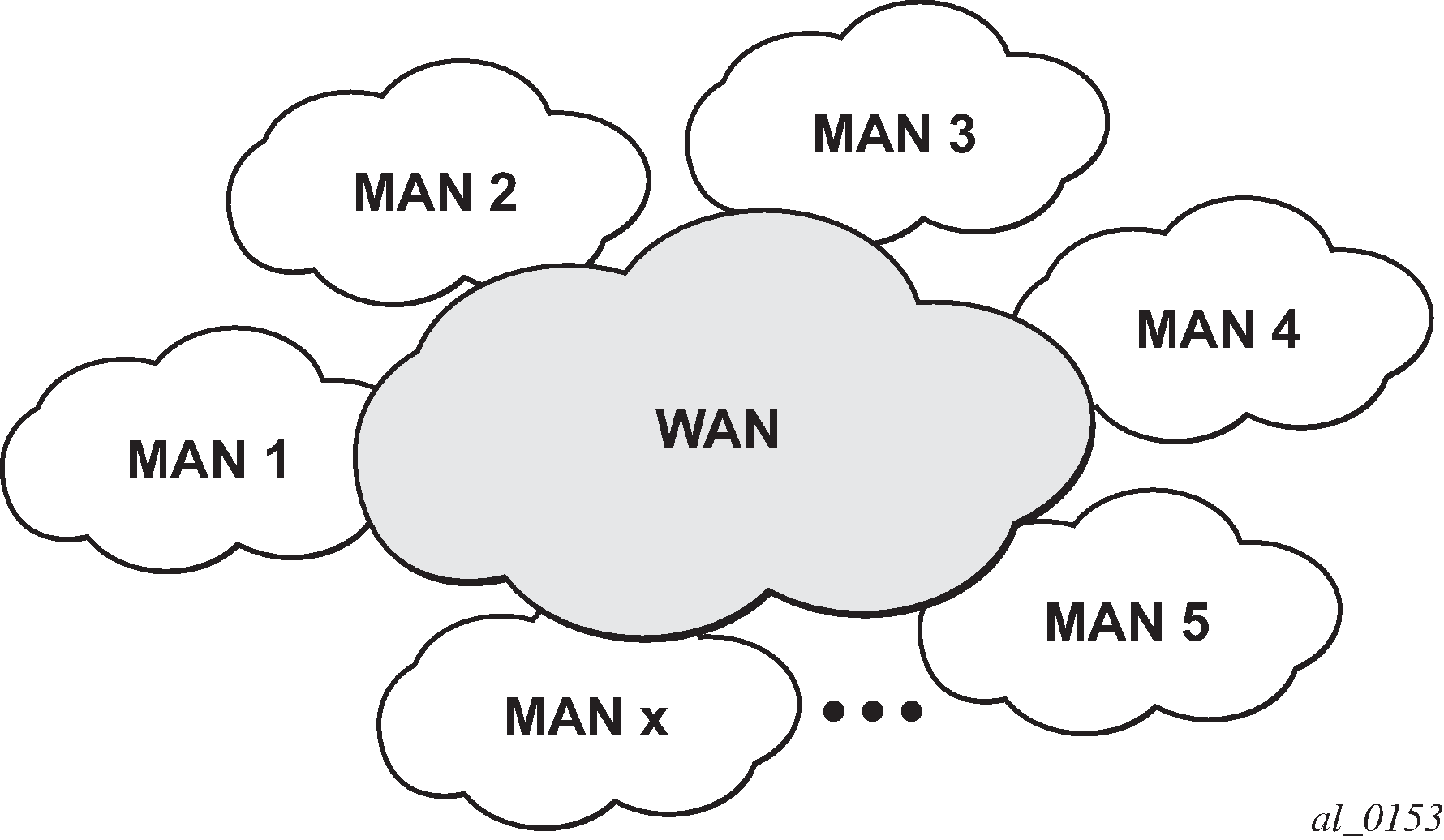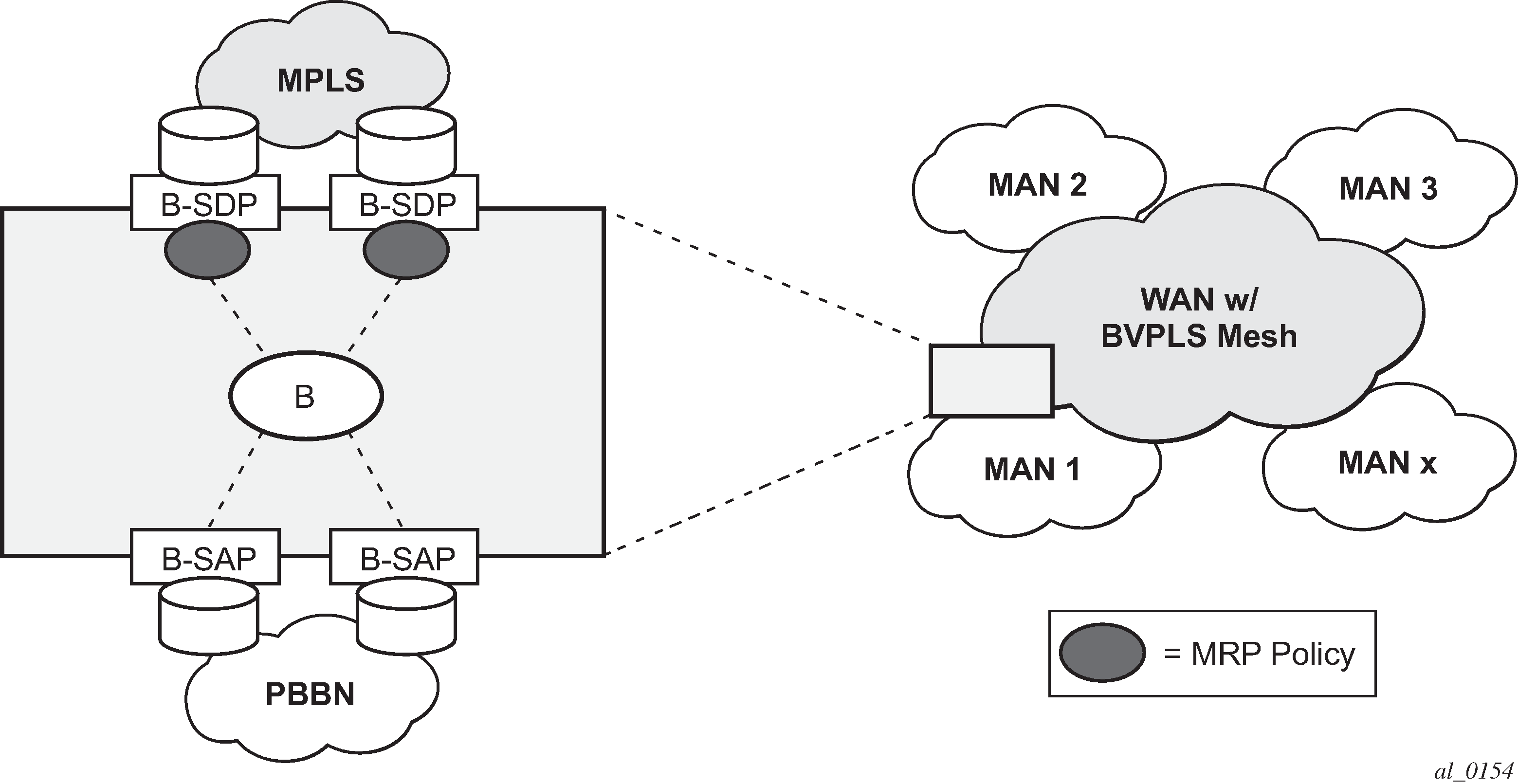MMRP advertises the Group B-MACs associated with ISIDs throughout the whole BVPLS context regardless of whether a specific IVPLS is present in one or all the related PEs or BEBs. When evaluating the overall scalability the resource consumption in both the control and data plane must be considered:
control plane
The control plane is responsible for MMRP processing and the number of attributes advertised.
data plane
One tree is instantiated per ISID or Group B-MAC attribute.
In a multi-domain environment, for example multiple MANs interconnected through a WAN, the BVPLS and implicitly MMRP advertisement may span across domains. The MMRP attributes are flooded throughout the BVPLS context indiscriminately, regardless of the distribution of IVPLS sites.
The solution described in this section limits the scope of MMRP control plane advertisements to a specific network domain using MRP Policy. ISID-based filters are also provided as a safety measure for BVPLS data plane.

Figure: Inter-domain topology shows the case of an Inter-domain deployment where multiple metro domains (MANs) are interconnected through a wide area network (WAN). A BVPLS is configured across these domains running PBB M:1 model to provide infrastructure for multiple IVPLS services. MMRP is enabled in the BVPLS to build per IVPLS flooding trees. To limit the load in the core PEs or PBB BCBs, the local IVPLS instances must use MMRP and data plane resources only in the MAN regions where they have sites. A solution to the above requirements is depicted in Figure: Limiting the scope of MMRP advertisements. The case of native PBB metro domains inter-connected via a MPLS core is used in this example. Other technology combinations are possible.

An MRP policy can be applied to the edge of MAN1 domain to restrict the MMRP advertisements for local ISIDs outside local domain. Or the MRP policy can specify the inter-domain ISIDs allowed to be advertised outside MAN1. The configuration of MRP policy is similar with the configuration of a filter. It can be specified as a template or exclusively for a specific endpoint under service mrp object. An ISID or a range of ISIDs can be used to specify one or multiple match criteria that can be used to generate the list of Group MACs to be used as filters to control which MMRP attributes can be advertised. An example of a simple mrp-policy that allows the advertisement of Group B-MACs associated with ISID range 100-150 is provided below:
*A:ALA-7>config>service>mrp# info
----------------------------------------------
mrp-policy "test" create
default-action block
entry 1 create
match
isid 100 to 150
exit
action allow
exit
exit
----------------------------------------------
A special action end-station is available under mrp-policy entry object to allow the emulation on a specific SAP/PW of an MMRP end-station. This is usually required when the operator does not want to activate MRP in the WAN domain for interoperability reasons or if it prefers to manually specify which ISID is interconnected over the WAN. In this case the MRP transmission is shutdown on that SAP/PW and the configured ISIDs are used the same way as an IVPLS connection into the BVPLS, emulating a static entry in the related BVPLS MFIB. Also if MRP is active in the BVPLS context, MMRP declares the related GB-MACs continuously over all the other BVPLS SAP/PWs until the mrp-policy end-station action is removed from the mrp-policy assigned to that BVPLS context.
The MMRP usage of the mrp-policy ensures automatically that traffic using GB-MAC is not flooded between domains. There could be though small transitory periods when traffic originated from PBB BEB with unicast B-MAC destination may be flooded in the BVPLS context as unknown unicast in the BVPLS context for both IVPLS and PBB Epipe. To restrict distribution of this traffic for local PBB services a new ISID match criteria is added to existing mac-filters. The mac-filter configured with ISID match criteria can be applied to the same interconnect endpoints, BVPLS SAP or PW, as the mrp-policy to restrict the egress transmission any type of frames that contain a local ISID. An example of this new configuration option is as follows:
----------------------------------------------
A;ALA-7>config>filter# info
----------------------------------------------
mac-filter 90 create
description "filter-wan-man"
type isid
scope template
entry 1 create
description "drop-local-isids"
match
isid from 100 to 1000
exit
action drop
exit
----------------------------------------------
These filters are applied as required on a per B-SAP or B-PW basis just in the egress direction. The ISID match criteria is exclusive with any other criteria under mac-filter. A new mac-filter type attribute is defined to control the use of ISID match criteria and must be set to isid to allow the use of isid match criteria. The ISID tag is identified using the PBB ethertype provisioned under config>port>ethernet>pbb-etype.